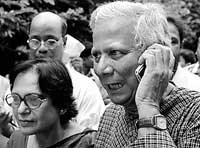| Bangladesh
bankers to the poor win Nobel Peace Prize
(Reuters) - Bangladeshi economist Muhammad
Yunus and the Grameen Bank he founded won the 2006 Nobel
Peace Prize on Friday for grassroots efforts to lift
millions out of poverty that earned him the nickname
“banker to the poor”.
 |
| Muhammad Yunus talks on his mobile with his wife
next to him |
Yunus, 66, set up a new kind of bank
in 1976 to lend to the neediest, particularly women,
in his native Bangladesh, enabling them to start up
small businesses without collateral.
In doing so, he pioneered microcredit,
a system copied in more than 100 nations from the United
States to Uganda.
“It's very happy news for me
and also for the nation,” he told reporters at
his home in the Bangladeshi capital, Dhaka.
“Now the war against poverty
will be further intensified across the world. It will
consolidate the struggle against poverty through microcredit
in most of the countries,” he said. “There
should be no poverty, anywhere.”
In awarding a prize more traditionally
given to those who forge treaties and fight for human
rights, the secretive five-member Norwegian Nobel Committee
said eliminating poverty was a path to peace and democracy.
“Lasting peace cannot be achieved
unless large population groups find ways in which to
break out of poverty. Microcredit is one such means.
Development from below also serves to advance democracy
and human rights,” the committee added.
“Eradication of poverty can
give you real peace,” said Yunus. “There
is no self-respect and status when you are burdened
with poverty.”
The academic and his bank were surprise
winners from a field of 191 candidates for the 10 million
Swedish crown ($1.36 million) award. Yunus said he was
looking forward to attending the formal award ceremony
in Oslo on Dec. 10.
Shocked by famine
Returning from a Fulbright scholarship
in the United States, Yunus was shaken by the 1974 Bangladesh
famine and headed out into the villages to see what
he could do.
He found the region's women in severe
debt to extortionate moneylenders. His initial goal
was simply to persuade a local bank manager to give
villagers regular credit, but the banker said that was
impossible without a guarantee.
Yunus set out to prove him wrong and
never looked back. Grameen -- the word means “village”
or “rural” in the Bangla language -- has
lent $5.72 billion since it began. Of this, $5.07 billion
has been repaid.
The bank, which has turned a profit
in all but three years, lends to 6.6 million people,
96 percent of them women, and has not received donor
funds in eight years. It counts beggars among its members,
giving them interest-free loans and life insurance.
Today the bank is 94 percent owned
by the rural poor it serves and 6 percent by the government.
“In Bangladesh, where nothing
works and there's no electricity,” Yunus once
said, “microcredit works like clockwork.”
Nobel Committee Chairman Ole Danbolt
Mjoes told Reuters: “This idea was generated in
a mostly Muslim country and then fantastically spread
to the whole world in a positive way.”
Yunus may have been a surprise winner,
but his achievements have won wide recognition.
“Everyone is talking about microcredit.
It was started by Yunus, one man in Bangladesh,”
U.N. Secretary-General Kofi Annan said in a 2002 interview.
Widening notion of peace
First awarded in 1901, the peace prize
has evolved to include the defence of human rights and
the environment.
The 2004 award went to Kenyan environmentalist
Wangari Maathai for a campaign to plant trees in Africa.
Last year's choice of the International Atomic Energy
Agency (IAEA) and its Egyptian head Mohamed ElBaradei
was more in line with dynamite millionaire Alfred Nobel's
original intent.
Not all observers have appreciated
the apparent shift.
“This should be a prize for
peace, or for encouragement to stay the course -- as
it was in my case, when it put more wind in my sails,”
1983 Nobel Peace laureate Lech Walesa told Polish television.
“Perhaps the name of the prize
should be changed to those who work to eliminate (economic)
differences?”
But French President Jacques Chirac
said the committee had rewarded “an exceptional
work in the service of solidarity, development and peace.”
(Additional reporting by Alister Doyle,
Sarah Edmonds, Marianne Fronsdal and Wojciech Moskwa
in Oslo, Paul Taylor in Brussels, Nizam Ahmed and Anis
Ahmed in Dhaka and Pawel Kozlowski in Warsaw) |
